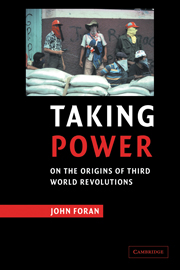Book contents
- Frontmatter
- Contents
- List of figures
- List of tables
- Acknowledgments
- Introduction
- Part One Perspectives
- Part Two Revolutionary success
- Part Three Revolutionary failure
- 4 The greatest tragedies: reversed revolutions
- 5 The great contrasts: attempts, political revolutions, and non-attempts
- Part Four Conclusions
- Notes
- Works cited
- Index
5 - The great contrasts: attempts, political revolutions, and non-attempts
Published online by Cambridge University Press: 22 September 2009
- Frontmatter
- Contents
- List of figures
- List of tables
- Acknowledgments
- Introduction
- Part One Perspectives
- Part Two Revolutionary success
- Part Three Revolutionary failure
- 4 The greatest tragedies: reversed revolutions
- 5 The great contrasts: attempts, political revolutions, and non-attempts
- Part Four Conclusions
- Notes
- Works cited
- Index
Summary
Revolution is the only form of “war” in which ultimate victory can only be prepared by a series of “defeats.”
Rosa LuxemburgThis chapter will take up three further types of “failure,” in the sense that social revolutions did not occur in conditions where we might otherwise expect them to. These include attempted social revolutions, political revolutions, and non-attempts. If we return to Theda Skocpol's touchstone definition of social revolutions as “rapid, basic transformations of a society's state and class structures … accompanied and in part carried through by class-based revolts from below,” we can derive useful definitions of the sorts of cases we would want to contrast these with to strengthen our empirical tests of the theory of their origins. Attempted social revolutions are the clearest example of this, for the goal of the revolutionaries was the same as in the successful cases – political and socio-economic transformation through class-based revolts from below. Note that this requires a conceptual counterfactual, for in the absence of success, how would we know that what was attempted was a social revolution? Here, we must rely on our readings of the intentions of the revolutionaries and nature of their movements, and I believe that most close observers of the eight struggles discussed below would agree that social revolutions were indeed on the agenda of the actors involved.
- Type
- Chapter
- Information
- Taking PowerOn the Origins of Third World Revolutions, pp. 205 - 244Publisher: Cambridge University PressPrint publication year: 2005



